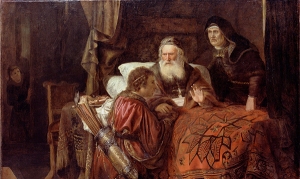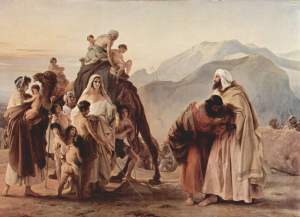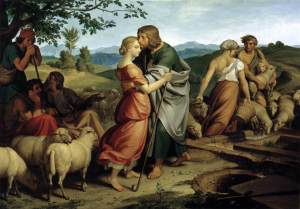Today’s passage of Scripture is Genesis 27:1-4 which reads: “And it came to pass, that when Isaac was old, and his eyes were dim, so that he could not see, he called Esau his eldest son, and said unto him, My son: and he said unto him, Behold, here am I. And he said, Behold now, I am old, I know not the day of my death: Now therefore take, I pray thee, thy weapons, thy quiver and thy bow, and go out to the field, and take me some venison; And make me savoury meat, such as I love, and bring it to me, that I may eat; that my soul may bless thee before I die.”
Allow me to share with you some commentary on this passage from the Reformation Study Bible by Dr. R.C. Sproul:
The theme of family conflict, between the parents and between the twins, now becomes full-blown in pursuit of the patriarch’s blessing. Isaac depended on his fallible senses rather than divine guidance, and Rebekah used deception. Esau broke his oath and Jacob blasphemously lied. Though the blessing is passed on according to God’s good pleasure, the divine verdict on their actions is pronounced in the disastrous consequences: Esau resolved to murder Jacob and Jacob fled the land. Rebekah died without memorial, and Isaac lived on without significance.
Implicit here is a contrast between Abraham, who in faith provided for Isaac’s future according to God’s elective purposes, and Isaac, who seems to have made no attempt to find suitable wives for his sons, and who tried to thwart the divine election.
Today’s quote about the Bible is from Karl Paul Donfried. He said: “The one thing the New Testament forbids us to do is to treat it as a static document to be used as a set of proof-texts for instant solutions to complex and controversial contemporary problems. To misuse the New Testament in this way is to deny its dynamic character and to fail to realize that the Word has to be applied in a specific context. …A static interpretation of the New Testament is dependent on a frozen Christology.”
Our topic for today is titled “Jacob and his Tribes” (Part 2) from the book, “The Promise and the Blessing” by Dr. Michael A. Harbin. And, I want to remind you to take advantage of our special offer. If you enjoy this podcast, please feel free to purchase a copy of this book — “The Promise and the Blessing” by Dr. Michael A. Harbin. It is available on our website for just $20. You can make your purchase today at covenantandcrosspodcast.com.
He goes on to say…

Sometime later, Isaac, getting on in years, realized that he was nearing death. The text does not indicate how old he was at this point; however, by carefully piecing together other chronological data, we estimate his age to have been about 136. (According to Genesis 35:28, he would then live another forty-four years.) But the text also notes that he was blind, which may have contributed to his foreboding. He therefore planned to bless his favorite son, Esau. Before he did so, however, he asked Esau to go hunt for some wild game to make a savory dish. As the account unfolds, we find Rebekah scheming with Jacob to prepare similar food from a kid. She disguised Jacob as his older brother, using Esau’s clothes; she also used the hair from the kid to emulate Esau’s hairy skin. The charade succeeded, and Jacob received the blessing that was intended for Esau.
The relationship of the meal to the blessing is unclear. There is only one other instance of an aged father blessing his son before he dies, and that is the same Jacob later in this same book. In that case, there is no mention of a meal. In fact, Isaac’s blessing itself raises questions. Clearly, it is distinguished from the birthright. The issue is especially confusing when we see the content of the blessing. For the most part, what Isaac said to Jacob indicated a life of prosperity, a “blessing” that easily could have been given to Esau as well (with the caveat that he would, indeed, serve his brother). So why did Isaac assert to Esau that the blessing was gone?
We find a key in the final phrase of the blessing: “May those who curse you be cursed and those who bless you be blessed.” The relationship of this phrase to the promise God gave Abraham in Genesis 12 suggests that perhaps what we are seeing is the insertion of this son into the line of the Abrahamic covenant. That would explain the distinction between blessing and birthright. It would also help explain why, after the death of Jacob, no blessings are recorded. After that time, all descendants of Jacob were included in the line of blessing, that is, the line of the Abrahamic covenant.
Jacob had no more than left his father’s tent after receiving the blessing when Esau showed up with a savory dish made from the game he had brought back. At that point, Isaac realized what had happened and acknowledged that Jacob had indeed been given the blessing. After tremendous protest, Esau talked his father into giving him a “blessing” also. This, like the blessing given to his brother, was really a prophetic declaration regarding his descendants. It had its positive aspects, but it pales in comparison to the promise that had been given to Jacob. Esau was furious. Suspecting that his father was on his deathbed (and certainly Jacob’s fraud would seem to hasten the event along), Esau let it be known that once Isaac was gone, Jacob would also be history. At that point, Rebekah intervened again.

